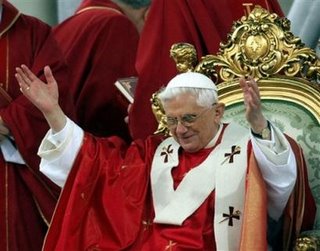Looking to the World to Come
 The Preface of the Ascension proclaims that Christ is the "king of glory... the mediator between God and man, judge of the world and lord of all... the head of the Church" and expresses the Church's faith and the Christian's hope that "where he has gone, we hope to follow". As such, our Head has already "ascended to heaven" and we, while still on earth, await the union of the Church, His Body with Him. Thus as Christians, we hold that heaven is our homeland, our true dwelling place is in heaven with the Blessed Trinity.
The Preface of the Ascension proclaims that Christ is the "king of glory... the mediator between God and man, judge of the world and lord of all... the head of the Church" and expresses the Church's faith and the Christian's hope that "where he has gone, we hope to follow". As such, our Head has already "ascended to heaven" and we, while still on earth, await the union of the Church, His Body with Him. Thus as Christians, we hold that heaven is our homeland, our true dwelling place is in heaven with the Blessed Trinity.Hence in today's Gospel, the Lord says twice: "They do not belong to the world anymore than I belong to the world..." (Jn 17: 14, 16); rather we belong in heaven with Christ who has gone before us to prepare a place for us. Because we are not of the world but are merely in the world, Jesus warns us that the world would hate us (cf Jn 15:18-20; 17:14). What is this 'world' that hated and persecuted our Lord and which hates his true disciples too? Fr Herbert McCabe OP says:
"Jesus goes to the extremes that he does because of the human world to which he has been sent, the less than human world to which he belongs, the only human world there is. It is because this human world is one of sin (not just a world with sins in it). It is a world maladjusted to the very purpose and point of being human"
Signs of the world's hatred for the Church and the Word she proclaims are legion. Recent events covered on the blogosphere which come to mind are the lies of The Da Vinci Code and the recent incident in the USA involving Ben Kessler. But in addition to this there are the many forms of injustice and opposition to the Church's social and pro-life teaching that indicate the world's hatred.
As Pope John Paul II said, the Church stands as a "sign of contradiction" before the world because:
"The Gospel of Christ constantly renews the life and culture of fallen man, it combats and removes the errors and evils resulting from the permanent allurement of sin. It never eases to purify and elevate the morality of peoples"
This tension between the world and its' sin and the Church and her eternal Gospel of truth, goodness and holiness is always with us, this "maladjustment" to true humanity is the magnification of the struggle of the human heart that St Paul describes so well in Romans 7:14-25. This conflict that rages in the human heart is why there is such resistance to divine truth; and this inner conflict is manifest as opposition to the Church who preaches, teaches and shows forth the truth of the Gospel.
 Hence the Holy Father, Benedict XVI taught with such clarity on Friday in Poland:
Hence the Holy Father, Benedict XVI taught with such clarity on Friday in Poland:"Every Christian is bound to confront his own convictions continually with the teachings of the Gospel and of the Church's Tradition in the effort to remain faithful to the word of Christ, even when it is demanding and, humanly speaking, hard to understand. We must not yield to the temptation of relativism or of a subjectivist and selective interpretation of sacred Scripture. Only the whole truth can open us to adherence to Christ, dead and risen for our salvation."
The very idea of being consecrated in the truth means that we are set apart for Christ. What are we set apart from? The world and its lies, illusions and empty promises. Indeed, the word 'ekklesia', which is used to name and describe the Church, is related to the earlier Jewish word, 'qahal', which means "to be called out". Hence, the etymology of the word 'Church' can convey the idea that we are called out of darkness, sin, the world to become the People of God (cf 1 Pet 2:9).
But this does not mean that the Church is called out of the world such that she is an entirely spiritual entity. Afterall, she is also a visible institution. So, Christoph Cardinal Schonborn OP explains:
"The kingdom of God is 'eschatalogical'. It belongs to the end time, yet the end time has already begun in Christ. His kingdom is not of this world, but it comes into this world. For where men become his disciples, they form not a group thrown together by chance but a structured fellowship that is constituted in a visible manner and displays in its fundamental structure an organic continuity with its origin. The Church's fellowship is neither a merely a secular religious grouping nor a purely spiritual community: it is neither an exclusively visible Church or an exclusively invisible Church. It is both at one and the same time, and in an inseparable fashion, earthly and heavenly Church, a structured society and a spiritual fellowship."
Hence, the Lord goes on to say in today's Gospel: "I am not asking you to take them out of the world, but I ask you to protect them from the evil one" (Jn 17:15). Truly, we cannot be taken out of the world; we live in it! Hence Yves Congar OP observed: "The world of tangible things is our assigned setting in which we live out our lives...", our lives of fidelity to the demands of the Gospel. Moreover, as the Council Fathers at Vatican II taught:
"While helping the world and receiving many benefits from it, the Church has a single intention: that God's kingdom may come, and that the salvation of the whole human race may come to pass. For every benefit which the People of God during its earthly pilgrimage can offer to the human family stems from the fact that the Church is 'the universal sacrament of salvation', simultaneously manifesting and arising the mystery of God's love... Christians, on pilgrimage toward the heavenly city, should seek and think of these things which are above. This duty in no way decreases, rather it increases, the importance of their obligation to work with all men in the building of a more human world."

Therefore, we exist in this world as its leaven, to be salt and light to the world; to fill it with the love of Christ, the truth that the Holy Spirit teaches us and to give the world hope in the promises of Christ, so as make the world more fully and authentically human and to advance all of mankind on the way to the Trinitarian life. Thus, the Church enhances and promotes true humanity and is the friend of humanity, contrary to the ideas the world has about the Church and the Christian faith.
It is also important to affirm that our disconnectedness from the world does not mean that the world, human culture and society is evil per se: that Manichean tendency is a real danger and temptation and it must be roundly rejected and resisted. What Christians reject is the glamour of evil, its falsehood and Satan's vain promises (cf Renewal of Baptismal Vows) which is found in the world. However, the world itself - as God created it and intended it - is fundamentally good. Therefore, Cardinal Schonborn summarises and paraphrases Gaudium et spes in saying that society (and the 'city of mankind'):
"In itself is good and possesses its relative autonomy, its own positive values, and its own finality: the 'common good' (bonum commune). Culture, science, economics, and politics have their positive values, which cannot simply be identified with man's ultimate goal, which can only be God... the kingdom of God, the 'civitas Dei', is this ultimate goal, which is already present in the Church and is to penetrate and reshape all temporal values, without calling their autonomy into question."
"For the Christian, heaven is already on earth, in a certain sense. For where he attempts in this time, with all its provisional character, to create space for love, to lend a voice to justice, to live peace, there - even in the midst of great deficiencies and miseries - something of heaven can already be sensed on earth... the Christian knows that the decisive struggle is not a 'class struggle' or a 'struggle for existence' but the continuous struggle against the power of evil, against the forces of pride, of arrogance, of hatred..."
Let us invoke the Spirit into our lives and be formed by His Love.
The images above show a Romanesque relief of the Ascension from the Abbey of Santo Domingo de Silos; the Holy Father in Warsaw and a stained glass window of Christ enthroned in heaven from Willingham Parish Church.








4 Comments:
Re: Ben Kessler
A video of his 'preaching' here:
http://www.youtube.com/watch?v=2sbPSPAxBnk
I get to listen to the Gospel being preached quite a lot - I'm a lucky guy. I don't get a terribly clear sense of the 'Freedom of the Spirit' - the freedom from the crushing burden of the Law - from Kessler's speech. On the contrary even, what comes across more - and perhaps what his listeners reacted against I would say - is hint of a moralising judgementalism. I don't take 'moralising judgementalism' to mean the same as 'Gospel'. If the world - or at least, parts of that audience - hated what was on offer, perhaps that's because the world isn't entirely stupid?
Thank you. I viewed the video some days ago... Granted the delivery is not the best but I don't think the tone was as bad as you make it sound: after all he says he too makes "selfish choices"... But then again, I don't mind when the Holy Spirit uses someone to tell me to buck up and reform my life!
And while we're on to the concept of so-called 'moralizing', how would one view the 'sermons' in the Acts of the Apostles? Judgmental? Moralizing?! Perhaps we just don't like being told to reform and change? Or being told we're wrong or need to re-think the choices we make?
The Spirit frees us with the truth of the Gospel and invites us to the freedom of becoming more fully and authentically human. That means, on occasion, challenging the status quo of our lives. Freedom in the Spirit means we are freed from sin to genuinely choose that which is true, good and beautiful.
The Law which we are all called to follow is the law of charity. And I think the reminder to relinquish selfishness and to "give yourself completely to the community" is a call to charity. Would you not agree with that?
Whatever one's views on the aptness of this speech, it makes a change to the platitudes and banal stuff that plagues most Commencement speeches!
"The Law which we are all called to follow is the law of charity. And I think the reminder to relinquish selfishness and to "give yourself completely to the community" is a call to charity. Would you not agree with that?"
Frankly - and in friendship - I'd be tempted to disagree, since I believe that the presence or absence of the 'grace of preaching*' in a particular address to a particular group of people is not identified or verified by the mere possibility of ticking the text of the statement off for correctness against a portion of the code of canon law or the catechism. I tend to think, on the other hand, that if a crowd of those actually present experienced their hearts burning within them as he expounded the Gospel to them, then that might well be another matter. It seemed rather hectoring to me & I don't myself think that's such a great default position for winning folks to the Gospel.
* See fr.Simon Tugwell's book 'The Way of the Preacher'.
I don't think Mr Kessler was 'preaching' nor aiming to expound the Gospel per se... he was merely calling people to re-examine their lives and the choices they make and he hoped that his classmates would find true happiness in acts of self-gift; and he did this within a speech (of which we only have a part) as an act of public witness to his faith. Every Christian is called to that at the very least.
I agree that tone and context are important if one is trying to win souls for the Gospel, but I am just not convinced that was his intention... Rather he thought he'd made selfish choices in life, had seen others make and consider making selfish choices and he called all (including himself) to make better, more loving (and less selfish) choices so as to become more truly happy people.
As far as I am concerned, I would not consider this speech 'hectoring', so it goes to show that different people can hear the same thing and react differently. I am sure that is the case for the people at UST and we see the same different reactions to sermons throughout the Gospels and the book of Acts. Nothing new here...
When was the last time your heart burned within you as a preacher expounded the Gospel to you? Rare, in my experience... Does this nullify all those preachers have said then?
Within the context of my entire post, I simply wish to say that the antipathy to his reminder of Christian teaching (and even the various comments about his action) is perhaps indicative of the basic discomfort people have when faced with the truth of one's life and the struggle to live with greater integrity in the light of the Gospel.
The Ben Kessler case may not be the best example but it is one that has excited the Catholic blogging community somewhat.
Hence, I follow up the example with quotations from Vatican II and Pope Benedict on how the Gospel message and Church teaching can stir us up and make us feel uncomfortable, even angry? I think that is why Ben Kessler was heckled and why some chose to walk out. But then again, we've seen this before in Jn 6, when people choose to walk from the truth.
Finally, since you write as a friend, I thank you. Your opinions are valued and I think we are broadly in agreement. It would be appreciated if friends do not post anonymously nor use obscure pen-names. Thank you.
As for the 'gratia praedicationis': of your charity, I ask you to pray for me as I will for you.
Post a Comment
<< Home